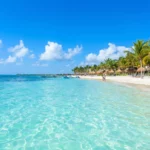Black Panther is set in the fictional country of Wakanda. The creation of the Wakandan African identity has been a contentious issue. Borrowing aspects of cultures from around Africa, it presents the world with a confusing sense of “Africaness”.
Wakanda is an amalgamation of African ethnic groups, with its “indigenous” outfits and symbols: cowry shells adornments, grass skirts, decorative scarring and lip plates. The average viewer won’t know that the language being spoken is Xhosa, a South African language, or that some of the garments are made with Ghanaian Kente cloth and designs.
Africa is a continent of 54 countries that are diverse culturally and geographically. But this “borrowing” could suggest that they were one and the same, their cultural markers shared and interchangeable.
So I was ready to be critical of Wakanda Forever and how it returns to stereotypes of Africa, collapsing different civilisations (many of which have fought each other) into digestible but erroneous “myths” of a homogenous Africa.
An African ‘homeland’
Wakanda Forever is a powerful meditation on grief and power. King T’Challa is dead and his family must pick up where he left off. Wakanda, previously believed to be a small weak nation, has made the true extent of its power known to the world, which also opens it up to foreign aggression.
It made me reconsider the importance of the myth of Africa as a place of harmony and welcome – an idealised Black space – for people across the African diaspora, especially for Black people in the US. The dream of returning to Africa for many colonised Black people in the Americas, even in death, was pervasive and could be heard in the rhetoric of Black leaders such as Marcus Garvey.
My own grandfather, born on a plantation in colonial Martinique, took his family to live in Senegal as he felt a calling from his “homeland”. He wanted to be embraced by his “African brothers and sisters”. The reality was very different and it took time for him to be accepted.
The US has historically been less connected to African cultures than many Caribbean nations. The lifespan of enslaved people in the Caribbean during the plantation period, due to horrific conditions, was very short. This meant there were low birth rates among the enslaved population.
New African captives were brought to keep the workforce stable, renewing African cultural connections. Wakanda is then, perhaps, a reflection of Black America’s lost connections, their dreams of a Black African utopia.
Wakanda evokes an Africa free of western colonial destruction. It’s resources and traditions have not been eroded. Its sense of culture is strong. And, left to develop at its own speed without foreign intervention, it’s a technologically advanced and superior national.
In the film, the Wakandans are positioned a people who avoided colonisation by turning inwards. They become the smallest but most powerful kingdom in existence, refusing to share their precious materials with the rest of the world or take part in global affairs. In the first Black Panther, after seeing what life was like for the formerly enslaved Africans in the US, T’Challa decides to open up and let people know about his country’s powerful metal resource, vibrainium.
Elements of a Black nationalist philosophy, based on the idea of empowering and uniting Black people who share a history of oppression and exploitation drive the kingdom of Wakanda as a Black utopia. This is symbolised by the “African” marketplace scenes in which food is in abundance and people dressed in traditional “African” clothing (with a futuristic twist) smile and shop in intergenerational harmony.
Some Black nationalists also advocated the establishment of a Black society separate from white people, a Black nation which flourishes in economical and cultural independence. Where Wakanda moves away from this ideology is in its lack of real interest in supporting Black people outside of Wakanda and reaching out to unite the disenfranchised Black diaspora.
Reclaiming ritual
The film celebrates the reclamation of an African identity through references to creation myths and diasporic storytelling traditions where ancestral wisdom is passed down through the generations.
Actor Chadwick Boseman, the Black Panther star who died of colon cancer aged 43, looms large in Wakanda Forever. The narrative itself centres around Princess Shuri coming to terms with her the death of her brother T’Challa, her feelings of inadequacy and her need for revenge.
If you don’t connect with your ancestors, we are told, you will remain in a state of spiritual stasis. Wakandan funerals draw from Yoruba Orisha ceremonies with mourners dressed in white and pouring of libations for the ancestors.
The queen mother processes her grief in “the bush”, sitting with her pain and performing ancestral rituals. She tells her daughter she has found her son “on the breeze, pushing her like a hand on her shoulder”. Shuri rejects this and the rituals, and her lack of faith is the main barrier to her success in leadership.
A popular counter-narrative to discrimination for people of African descent is the insistence that all our African ancestors were the “kings and queens” of great kingdoms and empires.
Yet at the heart of any kingdom is an uneven distribution of power and wealth and successful empires often rely on exploitation, theft and slavery. Thankfully, Wakanda Forever avoids the complete romanticisation of powerful monarchies, revealing the corrosive nature of the desire for control, the problem with unchallenged hierarchies and the stupidity of war.
Source : AllAfrica















